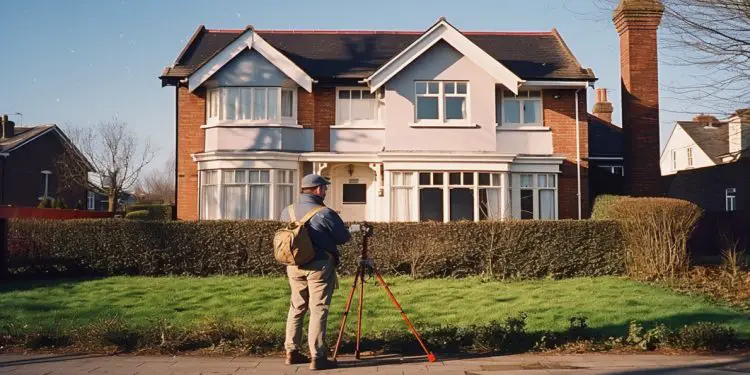The 7 Main Surveys You Need to Do When You’re Building or Renovating a Home

Building or renovating a home is such an exciting process. If it’s the former, then you’re breaking ground on a property that is going to be truly yours. You’ll have chosen everything from the building materials to the bathroom fittings. If it’s the latter, then you’re taking the opportunity to shape the place that you love into something that feels more like home. You’ll have gone through a lot to get to this point, especially given how much everyone is trying to save money right now. But it’s not always as straightforward as knowing what you want and having a budget that works for you.
To ensure that your project meets all legal and environmental requirements, it is crucial to conduct various surveys before and during the construction or renovation process. These surveys help you identify potential issues, mitigate risks, and make informed decisions.
1. Land And Topographical Surveys
Before any construction or renovation work begins, it is essential to conduct a land survey to gather accurate information about the site. A land survey helps identify boundaries, assess the terrain, and determine any potential challenges that may affect the construction process. Additionally, a topographical survey provides detailed information about the site’s physical features, including slopes, drainage, and existing structures. This data is crucial for creating accurate architectural plans and assessing the feasibility of your project.
2. Structural Surveys
Structural surveys are essential for both new builds and renovation projects. A structural survey involves a detailed inspection of the property’s foundation, walls, roof, and overall structural integrity. This survey identifies any existing structural issues, such as cracks, dampness, or subsidence, that may impact the safety and stability of the building. It provides valuable insights into the repairs or reinforcements needed to ensure the longevity and safety of the structure. The last thing you want is to get started on a new build only to realise that it’s never going to stand on its own.
3. Bat Surveys
In the UK, bats are protected by law due to their declining population. If your building or renovation project could potentially affect bats or their roosting sites, you are legally required to conduct a bat survey. These surveys help identify whether bats are present on the site and assess their ecological importance.
Bat surveys are conducted by licensed ecologists and typically involve a combination of daytime and nocturnal surveys. During these surveys, ecologists search for signs of bat activity, such as droppings, feeding remains, or roosting sites. They may also use specialized equipment, like bat detectors, to identify bat species by their echolocation calls. If bats are present, further surveys may be required to assess the scale of their activity and the potential impacts of your project. You can learn more about how bat surveys work and book a visit from the experts by visiting batsurveys.co.uk. They offer same-day quotes and a simple, hassle-free service to make sure that your work can continue with as little delay as possible.
4. Environmental Impact Assessments
For larger construction projects, an Environmental Impact Assessment (EIA) is often required. An EIA evaluates the potential environmental effects of a project and proposes measures to mitigate any adverse impacts. This assessment considers factors such as air and water quality, noise pollution, biodiversity, and socio-economic aspects. It aims to strike a balance between development and environmental conservation, ensuring sustainable practices are followed throughout the project. Air quality has been a major talking point in recent years in London and other cities, so don’t neglect this survey.
5. Contaminated Land Surveys
If you are building or renovating a previously developed site, it is crucial to conduct a contaminated land survey. This survey assesses whether the site is contaminated by hazardous substances, such as chemicals or pollutants. It helps identify any risks to human health or the environment, enabling appropriate remediation measures to be taken before construction begins.
Contaminated land surveys involve soil and water sampling, laboratory analysis, and historical research. They ensure compliance with environmental regulations and promote the safe and responsible development of land.
6. Archaeological Surveys
In the UK, historical and archaeological significance is highly valued, and any construction or renovation work must consider the potential impact on heritage assets. You might be surprised by what’s under your feet. An archaeological survey assesses the historical value of a site and determines whether there is a need for further investigation or preservation.
Archaeologists conduct surveys using various techniques, such as aerial photography, geophysical surveys, and trial excavations. If significant archaeological remains are found, the necessary steps will be taken to protect and preserve them.
7. Energy Performance Certificates
Energy Performance Certificates (EPCs) are mandatory for all properties being sold, rented, or newly built. Now, energy efficiency has been on everyone’s minds after prices skyrocketed over the last several years. They provide information about a building’s energy efficiency and carbon emissions. EPCs help homeowners and buyers make informed decisions about energy consumption, potential savings, and the environmental impact of their property.
EPCs are issued by qualified assessors who evaluate factors such as insulation, heating systems, and energy-saving measures. They provide recommendations for improving energy efficiency, such as installing double-glazed windows or upgrading insulation. This could mean that you have to pay some hefty costs upfront but it will save you money in the long run. Remember that we are likely to see more incredibly hot summers and extreme weather in the winter, so don’t ignore those recommendations.
What You Need To Remember
When embarking on a home building or renovation project in the UK, it is crucial to conduct a range of surveys to ensure compliance with legal requirements and promote sustainable development. Land and topographical surveys, structural surveys, bat surveys, environmental impact assessments, contaminated land surveys, archaeological surveys, and energy performance certificates are all essential for a successful project. By investing in these surveys, you can identify potential issues, protect the environment, and ensure the long-term safety, efficiency, and sustainability of your home.










